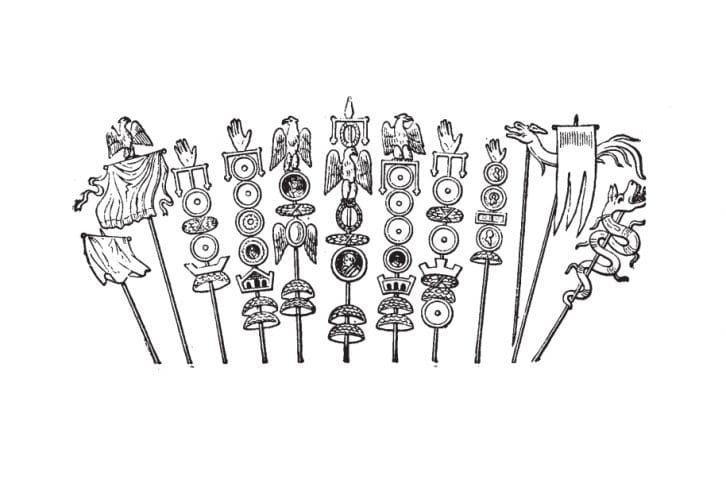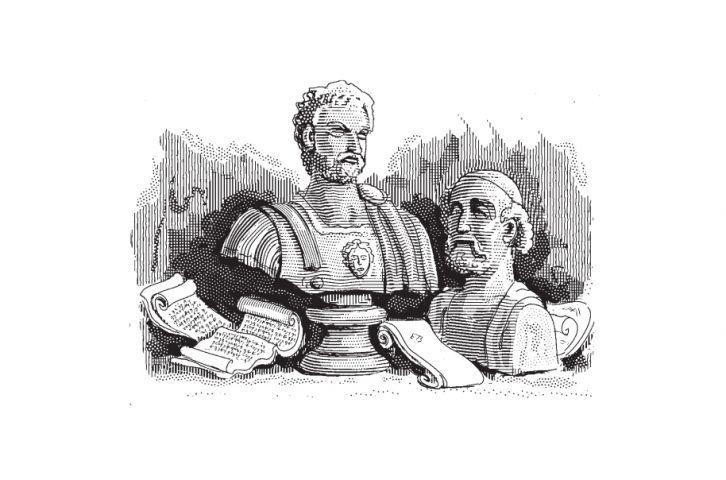Books Reviewed
A review of The Scandal of Empire: India and the Creation of Imperial Britain, by Nicholas B. Dirks;
The Roman Predicament: How the Rules of International Order Create the Politics of Empire, by Harold James;
and Among Empires: American Ascendancy and Its Predecessors, by Charles S. Maier
The rapid unfolding of dramatic events often leads to a lack of interest in the longer perspective. The 9/11 attacks, the projection of American power to Central Asia and Afghanistan, the quick armored war in Iraq, and the degeneration of the U.S. position there, all in hurried succession, have made it difficult for Americans to see the big picture. But precisely in such moments, we need to examine the situation with some detachment from, perhaps even coldness toward, the daily tragedies, and to rise above the details of policy. One way of doing so is to go back to history, mining it for lessons, warnings, and insights, though perhaps not policy solutions. The three books examined here, written by three historians, do exactly this: they look at the present sub specie historiae, in the laudable attempt to put the current strategic situation of the United States into a larger historical context.
Obviously, to look at the past with an eye to the present is also perilous inasmuch as history can be used to score political points. But the revival of interest in empires is welcome because no matter how we define American power, it is impressive in scope and size, and the challenges of managing it have historical parallels. Although the United States has exceptional characteristics, it would be foolish not to scour imperial history, both ancient and modern, for potential lessons.
* * *
Of the three books, the one by Nicholas Dirks, a professor of anthropology and history at Columbia University, is the most narrowly focused. And it is indignant. This is a book with a clear agenda, starting from a critique of the idea of empire from the perspective of the colonized ("critical colonial studies") and culminating in a condemnation of the West, from 18th-century Great Britain to 20th-century America, for its oppressive, power-hungry capitalism and imperialism (de facto synonyms in the book).
Dirks's core argument is that all empires are scandalous enterprises. In the case of Great Britain, imperial control over India had its origins in the corruption of the East India Company, a rogue quasi-state, organized and run for private profit. It effectively built its own state institutions in India, with all the trappings of power, from military force to a legal framework regulating its authority over Indian rulers, and as a result the company acquired enormous wealth for its agents and shareholders. When its corruption and violence grew to the point of endangering the political, legal, and economic well-being of Great Britain, the company was attacked, put on trial, and purged from the history of the empire.
The reckoning came by means of the late 18th-century impeachment trial of Warren Hastings, the first governor-general of British India, who was seen as responsible for the widespread profiteering and plundering. The main prosecutor was Edmund Burke, who in this book comes out as a worse offender than Hastings himself. The author accuses Burke of turning the scandal around, blaming the Indian rulers and the country's customs, and thus providing a lofty justification for further British rule over the subcontinent in the name, not of profit, but of the white man's burden. Through his great oratorical performances, Burke "laundered" imperial expansion, "exorcised" its past, made it a patriotic enterprise, and sanctioned more imperialist adventures by the British (as well as the West at large).
Dirks's history of the Hastings trial and the East India Company is fascinating, but his intent is hardly novel. He wants to send the reader to the dusty penitential corner where so many Western intellectuals spend an inordinate amount of time. He argues, ex cathedra, that the only way to judge actions is to consider how much they respect local values, customs, and laws. Burke's "mantle of universal morality," in Dirks's view, is simply a cover for his parochial defense of British rule of law. Though the great orator was committed to imperial reform, "we cannot forget which civilization he sought to serve." But not all empires have been Western, and not all empires have been equally scandal-ridden. Dirks has nothing to say about these cases. He does not even attempt to ground his own "universal morality" of respecting local customs, no matter how barbarous.
* * *
Princeton historian Harold James's book indulges neither "imperial nostalgia" nor imperial disdain. The book cover, portraying George W. Bush in Roman garb as a modern Caesar, is somewhat unfortunate inasmuch as James writes with care and nuance, rarely straying into sensationalism or political posturing.
The key question examined by James is what he calls the "Roman predicament," the challenge of maintaining international order through rules often perceived as arbitrary, or imperial, because they are formulated and enforced ultimately by someone's power. But these rules are also indispensable, because the alternative is chaos. The absence of imperial power is not peace, but all too frequently the opposite. To borrow James's language, Mercury, the god of commerce, requires Mars, the god of war.
Like Dirks, James is fascinated by late 18th-century British debates. He begins his book with a study of two British authors, Adam Smith and Edward Gibbon, whose The Wealth of Nations and The Decline and Fall of the Roman Empirewere published in 1776, a few years before the Hastings trial. Both point to the difficulty of maintaining an empire or, more broadly speaking, international order. Order is established by formulating and implementing a set of rules—rules that require some sort of power capable of enforcing them. But power provokes responses, often violent, against the established order, even if the rules are beneficial to all involved.
The alternative is to allow what James calls a "proliferation of values"; in Roman times, this took the form of polytheism, while in our times, it takes the form of multiculturalism. The problem with polytheism and multiculturalism, however, is that both involve "the suspension of a particular human faculty, that of judgment"—without which the international order tends to decay and disintegrate. James's argument—suggesting the need for exercising judgment on the basis of some common standard—moves in a profoundly different direction from Dirks's.
Is there a way out of the Roman predicament? Can we have Mercury without Mars, order without violence? James does not offer specific policy prescriptions, and in fact argues that the answer lies beyond the mere management of interests and power. As he explains in his conclusion: "Our debate must avoid the non-value-based escapism of simply technocratic solutions, and it needs to concern itself with fundamental values." Ultimately, James would have us return to a dialogue based on something like shared natural law, and he thinks the conditions may be developing to make possible such a return.
Such a return, in the author's view, is not inconceivable. For instance, the rapid unraveling after 9/11 of the European project of multiculturalism, the realization among Europe's secular intellectuals that modern rationalism alone cannot defend Western values, and an emerging cross-religious dialogue—all these developments seem to indicate that we may be entering a post-multiculturalist era. The question remains, however, whether such a dialogue is likely to occur not just within Europe but between Europe and other regions. The Catholic theologian Joseph Ratzinger (now Pope Benedict XVI), as James notes, may find common ground with the liberal philosopher Jürgen Habermas. But will either be able to find common ground with Islamic intellectuals and Islamic religious leaders? So although James's erudite book provides the reader with a glimmer of hope, this is not an optimistic book. The Roman predicament—the need to have imperial power in order to enjoy a modicum of order—may, after all, remain a historical constant.
* * *
This historical continuity in empires is the subject of Charles Maier's Among Empires. The author, a professor of history at Harvard, accepts the starting point of the previous two books, that American ascendancy has historical parallels. The first part of the book is a remarkable comparative analysis of several empires, from Rome to Great Britain, and their challenges. It begins with perhaps the most basic issue: what exactly is an empire? Maier describes several aspects of imperial rule, from the use of violence to conquer and control to the establishment of new transnational elites, but prudently avoids a one-line definition. He does well by simply listing and analyzing various features of this "recurrent structure" in international relations, as if there were no such thing as the idea of empire, but only different empires. Some empires "are bloody-minded associations for conquest and exploitation; others settle into patterns of inertia that frustrate fanaticism."
What unites all empires is a similar set of problems. The challenge of imperial administration is particularly acute on the frontiers, which is where the action is, and where the fate of empires tends to be determined. One of the crucial strategic issues for empires is to figure out where to draw the line separating them from their adversaries, and how to sustain it. If frontiers are managed well, the empire is stable and generates trust; if frontiers are under assault, the whole edifice of the empire, and not just the periphery, is at risk.
Maier convincingly argues that in the 1990s the United States may have thought of itself as a post-territorial entity, not limited by boundaries and detached from territorial concerns, managing and benefiting from a global system of free transactions. But this utopian bubble burst on 9/11. "The logic of territory reasserts itself," he explains, and frontiers, whether in the Middle East or within European societies, become again zones of violence and blood. Frontiers now become even more crucial because they define the regions marked by the imperial peace, as distinguished from the zone that remains unaffected by it. History is in fact coming back, and with a vengeance.
The second part of Maier's book focuses on America's role in the world post-1945. He argues that the U.S. has been steadily shifting from an empire of production, exporting the American economic model, to being an empire of consumption. The U.S. relies on the periphery (Japan, China, and others) to finance American expenses. Maier's treatment of this subject is disappointing, often meandering between vague discussions of political economy and assertions about empire. He does not even take a consistent position on whether the U.S. is, or is becoming, an empire. There are real dangers associated with the slide toward empire, from the growth of the executive to the rise of new elites. But empire is also attractive, Maier declares, because it permits things like interventions to defend democracies and human rights. Despite ambiguities, however, Maier has written a highly intelligent book that avoids the pitfalls of much of the literature on empires.
The three books under review are quite different in scope, subject matter, and perspective, but they do agree on one crucial point: empires are not anachronistic political forms but will continue to appear in the political life of mankind. Recognizing this helps us to take a more realistic view of the world. Conflict is here to stay, and imperial power may be indispensable to our survival.



